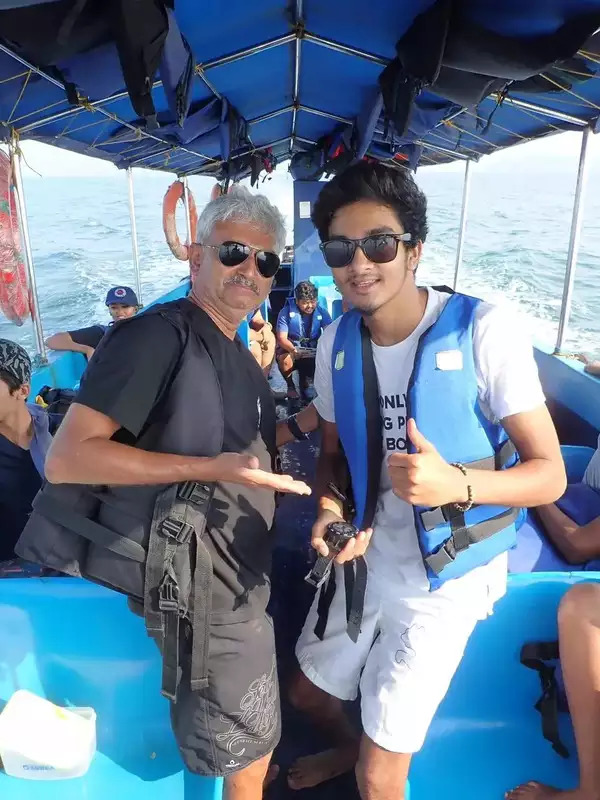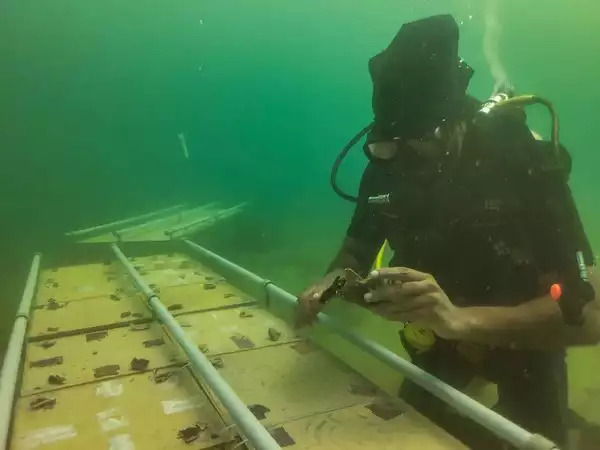(March 20, 2024) While the majority of his weekdays were spent working for a bank in Hong Kong, his weekends were all about binging on nature documentaries. Enamoured by marine life, Venkatesh Charloo decided to be a diving instructor. With this dream in his sights, he returned to India in 1995 and joined the Barracuda Diving Centre in Goa. A decade into diving in oceans, something strange happened in the summer of 2007 when Venkatesh was diving at the Grande beach in Goa and he found an angel fish caught in a ghost net. Seeing her struggling to get out, he spent the next few minutes untangling the net in an attempt to save her life. By that time, the fish was completely exhausted, and couldn’t swim anymore and just lay on Venkatesh’s palm for a while, recuperating. After regaining strength, it didn’t dart away into the ocean, instead, it rubbed itself against his hand, as if thanking him. “Even after all these years, I can’t believe I had this experience. I remember thinking that it was time to give back to the oceans,” said Venkatesh, who is a marine conservationist and founder of Coastal Impact.

Conserving marine life
That incident propelled Venkatesh towards marine conservation, and two years later, he ended up starting Coastal Impact, with the aim to study and monitor marine ecosystems and help build interest among local communities. “It dawned on me that there are so many marine beings dying around us and there’s very little we are doing to save them,” he said in an interview.
The voracious monsoon of 2009 led to the shutting down of the diving centre, owing to heavy rainfall. This presented Venkatesh with an opportunity to start working in the area of marine conservation – taking the first step in creating awareness. He began by doing presentations in schools and colleges, and educating local people about marine life, and realised that people were keen to know more. Moreover, he collaborated with marine biologists for underwater surveys. “We would do line transects for them, and even do underwater videography and photography which was a great learning experience. Slowly all of these experiences moved me towards conservation,” he revealed.

Why corals are important
This propelled him to start Coastal Impact in July 2009 with the aim to increase the coral cover in Goa – which is currently seen around three islands – Grande, St George Island, and Pequeno. As the marine world of Goa is home to 65 types of fish and 30 species of corals, Venkatesh wants people to know about the rich biodiversity that exists in the oceans. Calling corals the foundations of the oceans, Venkatesh added, “Corals act as a barrier between big waves, tsunamis, and helps the health of the oceans. Even if they form only 1 percent of the surface of the entire oceans, they support 25 percent of the biodiversity that exists.” Moreover, oceans are responsible for producing up to 60-70 percent of the oxygen we breathe. In the years that he has been in Goa, he saw many corals dying due to fishing, plastic, water pollution, and climate change. “This is putting a lot of stress on the corals.” He was called to take action through coral transplantation. “Our work in coral transplantation involves continuously monitoring and rescuing fragmented corals, and physically relocating them from inhospitable sites to favourable habitats where the coral is more likely to thrive,” the Global Indian said.
The process of coral transplantation
With a grant of ₹20 lakh from the Habitats Trust, he along with volunteers embarked on a journey to transplant corals in Goa. It was while reading about Florida-based Mote Marine Labs, that he accidentally discovered the process of transplanting corals on land in aquariums, which is called micro fragmentation. “We pick up broken but alive pieces of coral. We cut the corals and then fix these fragments into the transplantation site. We measure and document the growth of the coral through photography,” he revealed. Once the corals mature, they are then outplanted onto the reefs where they become one with nature. In the pilot project, 192 coral fragments were transplanted, and they have shown a growth rate of nearly 500 percent over the span of two years.
Moreover, he started Coral Crusaders, a coral adoption initiative by Coastal Impact in which they put corals up for adoption for ₹5500 and have already had 110 fragments of corals being adopted. The money is used towards future transplantation as well as monitoring and maintaining the existing corals. “I truly believe people want to do good in the world, one just has to give them a legitimate and right path where they see the value and want to associate with,” he said. The progress is a bit slow and Venkatesh believes that marine conservation isn’t getting the right attention. But he plans to continue his efforts in Goa and hopes that more people and companies work together towards collective impact.
Venkatesh began his career as a banker but he still likes to call himself “a banker who is now protecting a much greater wealth – marine biodiversity and the environment.”
- Follow Venkatesh Charloo on LinkedIn



